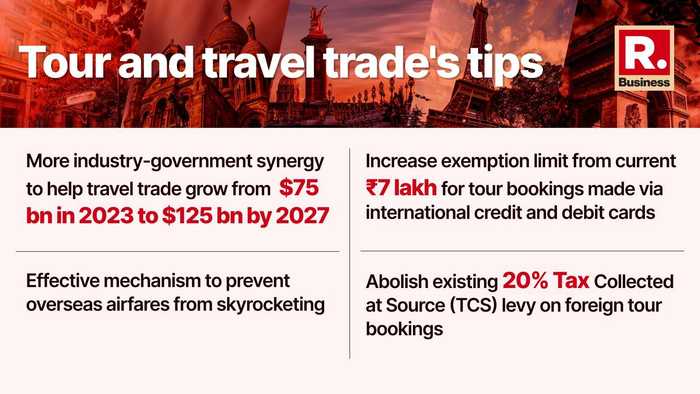Published 18:13 IST, January 11th 2024
20% TCS removal on overseas tours to help travel trade: Subhash Goyal
Chairman of Aviation and Tourism Committee of Indian Chamber of Commerce, Goyal is upbeat on 2024.
- Republic Business
- 4 min read
Travel trade outlook: The travel industry’s revival, after having reached the lowest ebb during COVID-19, has been led by an uptick in global tourism activity. Aviation and Tourism Committee of industry lobby Indian Chamber of Commerce (ICC), is among several umbrella bodies seeking measures, which could provide a boost to the travel sector. Chairman of the committee, Subhash Goyal in an interview told Republic Business that among other measures, imposition of higher Tax Collected at Source (TCS) rates for purchase of overseas tour packages in October 2023 must be done away with.

Republic
Higher TDS on overseas travel
Travel players are fearing that imposition of higher Tax Collected at Source (TCS) rates for purchasing overseas travel packages made effective in October, 2023 may dwindle tour bookings from the country. Goyal, who is also Chairman, STIC Travel & Air Charter Group says the imposition of 20 per cent TCS on foreign travel was a shocker to the travel sector. “The heavy taxes will restrict the overseas movement of travellers. Taxation measures have to be traveller -friendly,” said Goyal.
Encouraging use of credit cards abroad, will also require levy of no TCS. This will encourage people to pay abroad to save 20 per cent TCS for their hotel and sightseeing and the Indian travel agent will be the biggest losers, says the travel industry veteran.
Ceiling for TCS levy on international debit, credit card
Users of international credit and debit cards, spending plastic money for transactions of up to Rs 7 lakhs over a period of one year, are exempted from TCS. However, Goyal says this limit is not enough for exporters and inbound tour operators.

Image credit: Unsplash
“ With an aim to earn millions of dollars in foreign exchange, exporters have to participate and exhibit in trade shows all over the world throughout the year. The ceiling of Rs 7 lakh is too less for this segment of credit and debit card users,” says Goyal. Entrepreneurs travelling abroad to attract investments, and tech companies deputing employees for servicing their clients also feel need for a higher ceiling, he says.
Outbound travel taxes
Slashing of taxes on outbound international travel is also a measure to help India achieve its objective of becoming an aviation hub, Goyal says. “In the next few years, the country will have about 2,300 aircrafts operated by airline companies, which means we are not only going to double but triple our airline traffic. This is expected to increase five times over the next 3 years. The capacity created by these aircrafts cannot be fully utilized by domestic travel alone,” Goyal said.

Thailand, Saudi Arabia, Australia, Turkey, Vietnam and Sri Lanka are among nations banking on Indian travellers and looking to ease their entry. As per Goyal, visa on arrival facility in these countries is a result of the spending power of the outbound Indian tourists. “Indians are amongst the top spenders in Singapore, Malaysia, Thailand, Sri Lanka, Nepal, Dubai and UK,” Goyal said. In 2019, 11.5 million Indians travelled abroad, while the outbound tourism industry of India is a lucrative market for the global tourist destinations.
Boost to tourism sector startups
For any startup to make a mark in the tourism industry, availing different government schemes is a viable option, but being self-sufficient is the key, says Goyal. “The companies making a foray in hospitality and tourism should gain sufficient knowledge on the country's geography and tourism ecosystem globally. Even before attempting any financial aid or funding, startups must have a proactive website. They should specialise in one aspects of tourism,” Goyal said.

Image credit: Unsplash
On mushrooming growth of travel portals, Goyal says: “These portals are there to stay and there is no way any trade organisations can regulate them. It is a free market economy where it is survival of the fittest, my advice to travel agents and tour operators is to start digitalising and promoting your products on internet and social media.”
More events of G20 level
The G20 Presidency of India has helped to leverage the country's tourism potential all across the world, says Goyal. Air connectivity to India needs to be enhanced while airfares are expensive. “The return airfare from US or Canada which was Rs 50-70 lakhs in 2019 to Rs 1.5 lakhs lakhs and domestic fares in India are on the higher side. This discourages international travellers from visiting India. Closure of overseas tourism marketing offices is a decision that needs to be revisited. We have to capitalise the publicity created during G20 events,” Goyal said.
Updated 16:31 IST, January 18th 2024